In a comment to one of the previous articles on VC→ the question was raised “how to calculate the economic benefits from the introduction of AI? it's not free, and the amount of savings is not obvious.” Indeed, the cost of implementing AI may seem too high precisely because the return on investment is not clear. However, AI in business is already providing real benefits to many companies: it reduces costs, improves the accuracy of operations and helps save resources, freeing up employees' time for more marginal and creative tasks.
In this article, we'll talk about how AI takes on routine tasks and increases the efficiency of your employees, and helps your company prosper. Andrey Putin, founder of KT.team, will use examples and cases to explain why the introduction of AI is not just a trend, but a practical tool for business growth and optimization.
And for starters, here are some of our favorite statistics.

AI frees specialists from routine work and increases their efficiency: the case of HR and developers
HR specialists mainly communicate with people, but also do a lot of routine work: monitoring indicators, preparing assessments and giving feedback. AI assistants streamline these processes so you can focus on more important things.
Imagine HR specialist Oleg. He works for a 150-person company with one of three HRs.
In the morning, he meets with new employees who are here for the test week and introduces them to the team or interviews candidates. Oleg is constantly busy throughout the day: answering questions from newcomers, meeting face-to-face with employees, assessing their performance, and conducting pulse surveys.
Data on all these tasks should be entered into systems on a daily basis and analyzed: what is employee satisfaction? What are the most common questions and concerns they have? What are you most satisfied with? What alarms are there from employees?
Oleg felt like a hamster in a wheel: routine tasks took up almost all of his time, and there was almost no energy left for strategic tasks. Oleg stayed at work every evening to prepare a report for the manager or to complete feedback after the interviews.

The AI assistant collected data, analyzed questionnaires, assessed performance and prepared reports. And Oleg focused on something that can't be delegated — communication. It can be said metaphorically that instead of pedaling, Oleg got behind the wheel of HR processes. He was able to meet candidates and newcomers more often and better understood the joys and problems of employees. After the introduction of AI, the eNPS index increased — an assessment of employee loyalty.
On the other hand, there are professions in which communication does not seem to be the main part of the job. For example, developers spend most of their time writing code. According to research, some of them are so immersed in working with computers that they lose their empathy skills. However, for an excellent result, the developer does not need to write more code, but to better understand the customer's goals.
Programmer Andrey is used to receiving decomposed tasks and clear instructions from the project manager. He didn't try to dive into the details of the feature: why is it needed, what goals does the customer want to “cover” with it? Because of this, Andrey worked mechanically, that is, he wrote code for individual tasks in the task tracker, did not understand the entire product development track and did not understand how a particular feature should strengthen it. But often the result did not fully meet the customer's expectations, and Andrey had to redo the same thing several times.
Why did this happen? The manager might not have decomposed the task that way. Or decompose it so finely that the meaning was lost. Or, during decomposition, some of the requirements that were important to the customer were lost. There are a lot of reasons.
Not so long ago, Andrey started using AI in writing code. After all, the git has millions of lines of code on how to solve problems in common languages. And the code is the same dataset, that is, a source of knowledge for AI.
Using AI allows Andrey to spend less time working as a “typist”. Now he has time to dive into the details of the project and understand the customer's needs.
Now most of Andrey's working time is not spent on coding. He meets with the customer to better understand the goals and value of each new feature in the app. He knows what metrics the feature should improve, how it should integrate into the current system, and how it will develop in the future. He thinks through the feature's logic more deeply and carefully.
... And then he writes a detailed prompt, on the basis of which the AI generates almost ready-made code. Andrey will only have to test and refactor it.
As a result, the customer accepts 90% of the features the first time, because they fully meet the requirements and goals of the project, while the rest are accepted with minor changes. Thanks to this, the customer's company brings the product to the market faster and saves resources. And the IT team gets higher scores in terms of customer satisfaction and has become more marginal, as it hardly works under warranty, meaning they don't spend time rewriting or rewriting.
Does it look like a cottonamp story? But we at KT.team have already started implementing this approach. And experience has shown that it works.
AI makes it easier to find information and work with documents
AI optimizes data analysis and information management. A vivid example is the search for information in various documents. The company's data warehouse contains templates and recommendations, regulations, editorial policies, records and transcripts, checklists, a brand book — hundreds of folders with thousands of files created by different people.
Imagine that among all this data, you need to find, say, how to process a business trip and see how to submit reports to the accounting department and which checks to keep. You don't know the date and time when the regulations were created, you don't know the name of the file, and it's hard to find it arbitrarily. You'll have to search through dozens of files to find one line you need.
AI It allows you to find a specific document even by a small detail of its content — name, date, phrase from the problem discussion or by area of use. It can analyze thousands of files in ten seconds, show the information you need in an easy-to-read form and link to its source

Another problem with large amounts of data in storage is the obsolescence of documents. They are losing relevance, duplicating or starting to contradict each other. Sometimes it's easier to create a new file than to figure out which one to use. This leads to confusion and inefficient work among the company's employees. AI can find outdated documents and determine what data needs to be updated.
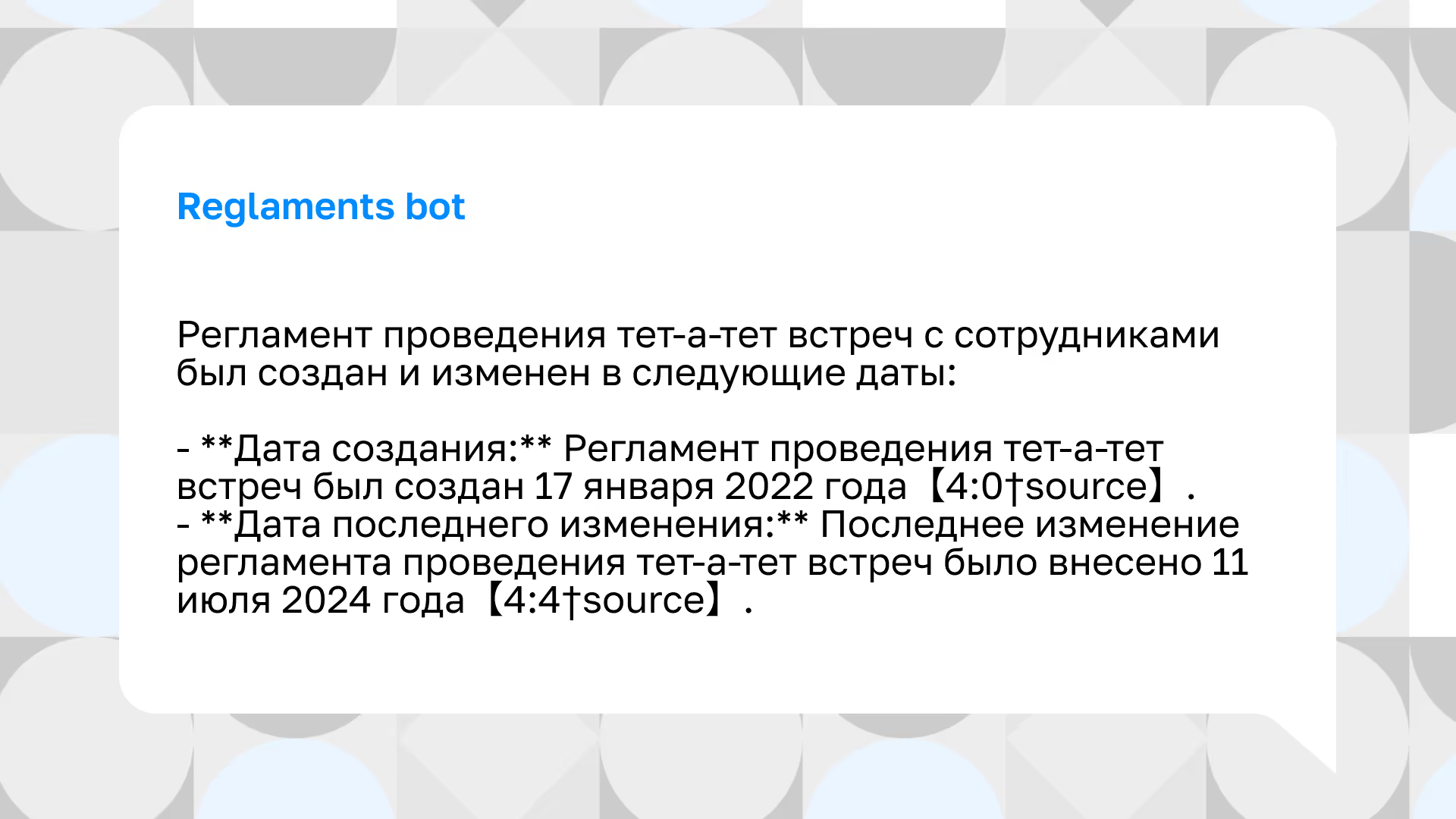
AI accelerates management decision-making and makes them more accurate
Management decisions vary from hiring a new employee to building a financial strategy for three years. Here we will look at a special (but common) case — participation in a tender: its feasibility, speed and quality of preparation of tender documentation, and the number of approvals.
Companies often have only one tender specialist who assesses the prospects of applications. He studies dozens of tenders every week and decides which ones to participate in and which ones to refuse. Due to the large amount of work, he does not always have time to process applications: the documentation can contain hundreds of pages, and only on page 75 it becomes clear that the tender is not suitable. The company will not take part in it, and the specialist simply did not have time to get to more suitable options. As a result, the specialist's time was spent and was not enough for a more promising tender. The company has lost revenue potential.
This can be avoided by speeding up the collection of information and the verification of tenders with the help of an AI assistant. For example, the search for current tenders always uses the same algorithm and on the same sites, so it is easy to automate it:
- download information about all tenders from the right sites;
- filter tenders by key parameters — keywords, customer areas of activity, revenue, tender cost, etc. ;
- analyze the prospects of participation using an algorithm that a tender specialist is already using, etc.
AI learns on company data, so it takes into account previous assessments and the criteria by which the specialist determines whether to apply for participation: cost, number of applications, request. Even the selection of tenders for evaluation is becoming automatic and individual — AI selects only those that are interesting to the company.
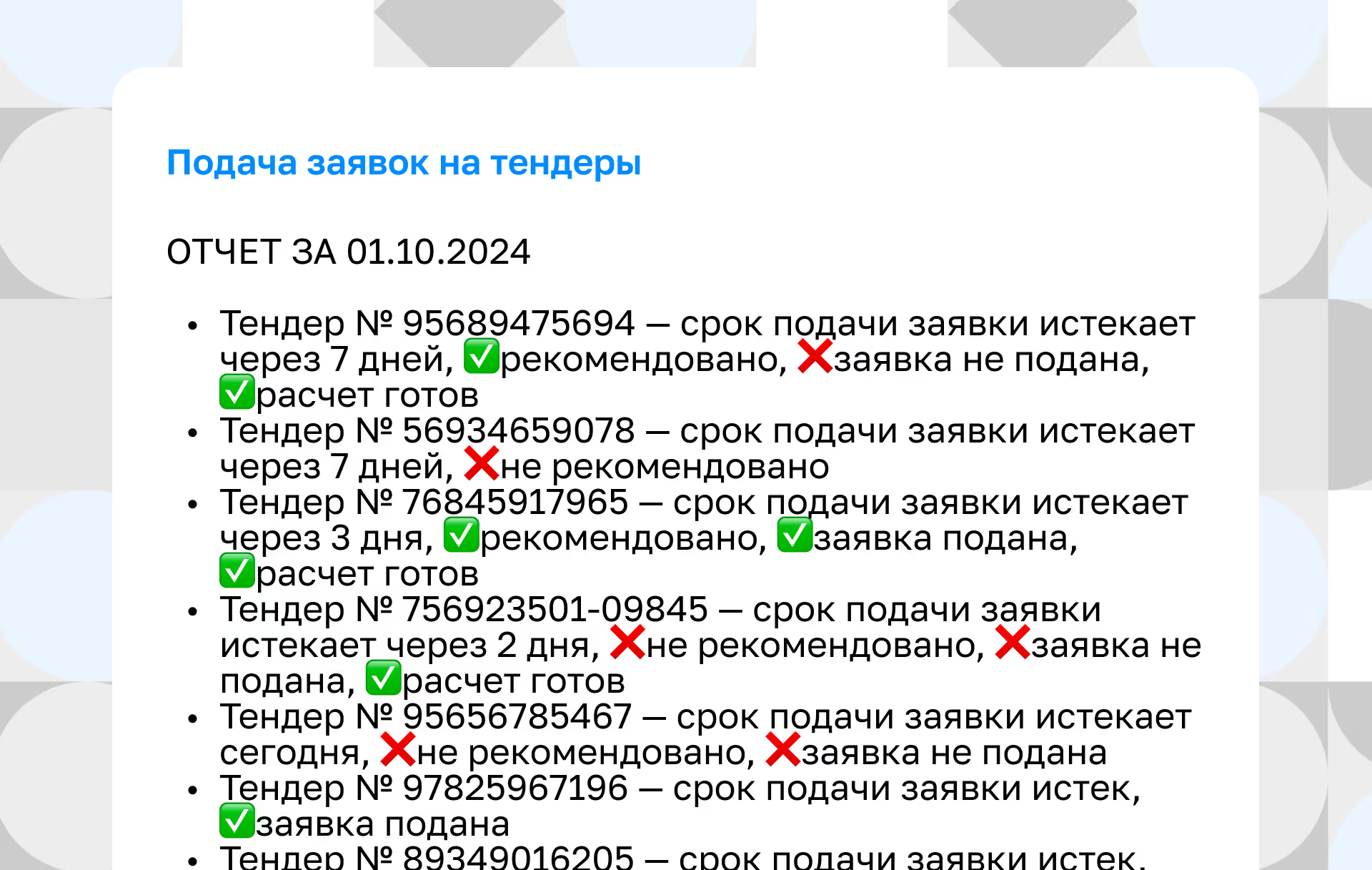
The AI assistant breaks down the tender tasks into stages and evaluates them in hours and money, and then provides a detailed technical specification and assessment that the expert only needs to verify. The whole process takes a few minutes and frees up about 30% of the expert's time only on Like4Like, that is, only in terms of the number of tenders he could process manually. As a result, the same employee evaluates several times more tenders than before.
To create a list of documents for participation, an AI tender assistant finds keywords in the documentation and site request. He processes applications according to the site rules, and if your database suddenly does not have enough of the necessary certificate, he notifies the person about it. After the introduction of an AI assistant, the conversion from applications to winnings increases by 10-30%, and refusals due to non-compliance with tender rules are reduced to almost zero.
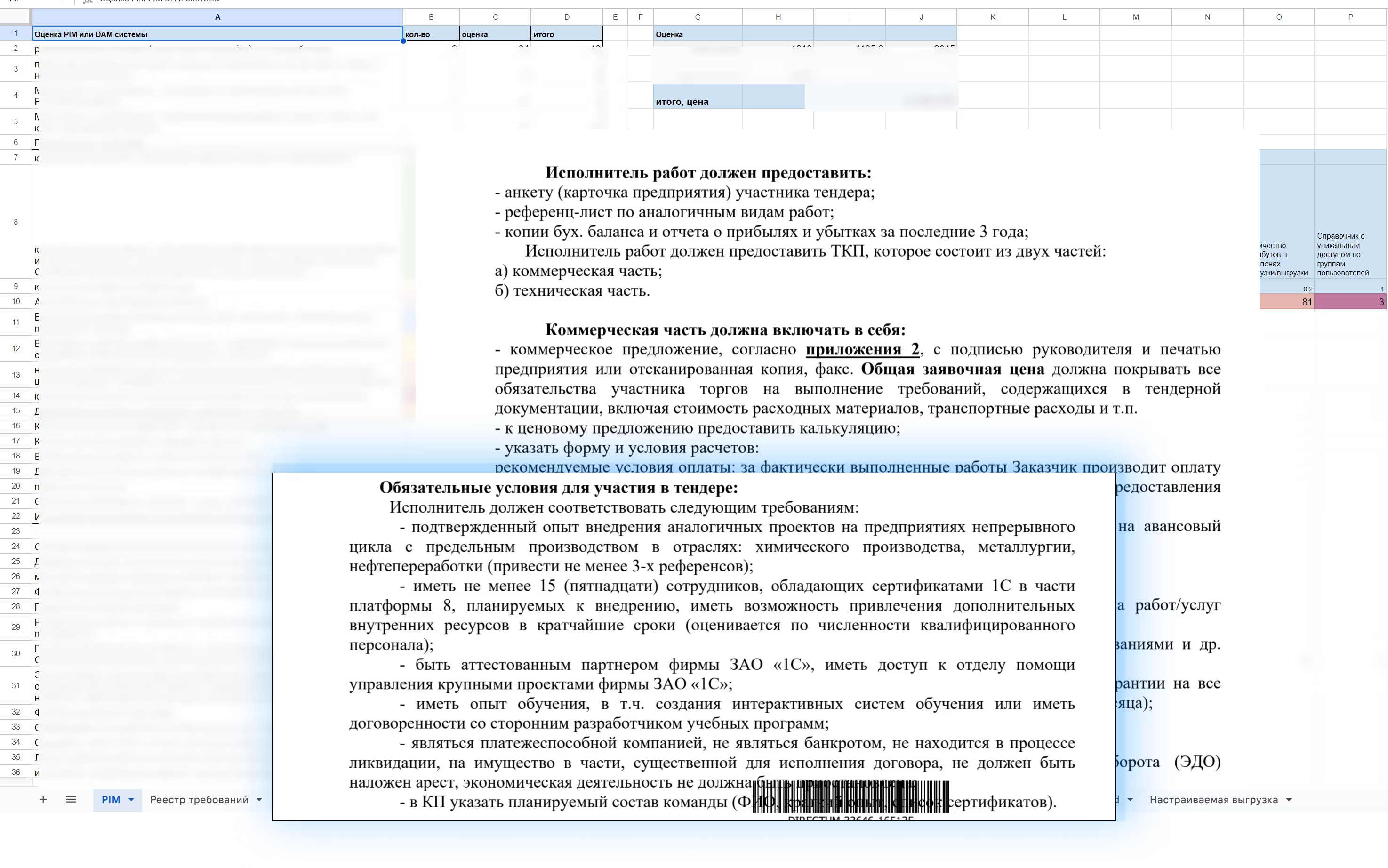
AI analyzes any amount of accumulated data and provides feedback
What is the life cycle of your sales team's meeting? It is prescribed, carried out, results are recorded and... what's next? If the sale did not take place, how do you analyze the reasons? If a client wants to come back to their questions in six months, how do you prepare for a new meeting?
Imagine that you can communicate with transcripts of meetings like a real person. Another tool will help with this: an AI meeting secretary for sales departments, project teams, technical support, and training for new employees. It saves video and audio calls and can analyze them for any query. It can find the information you need, even if it is stored in different files.
For example, AI will recall the history of meetings on a particular project or suggest what topics were discussed last month. You can ask a question in a free form, as if you were talking to a colleague. At the same time, the search takes only a few seconds, and the answers are detailed and structured.
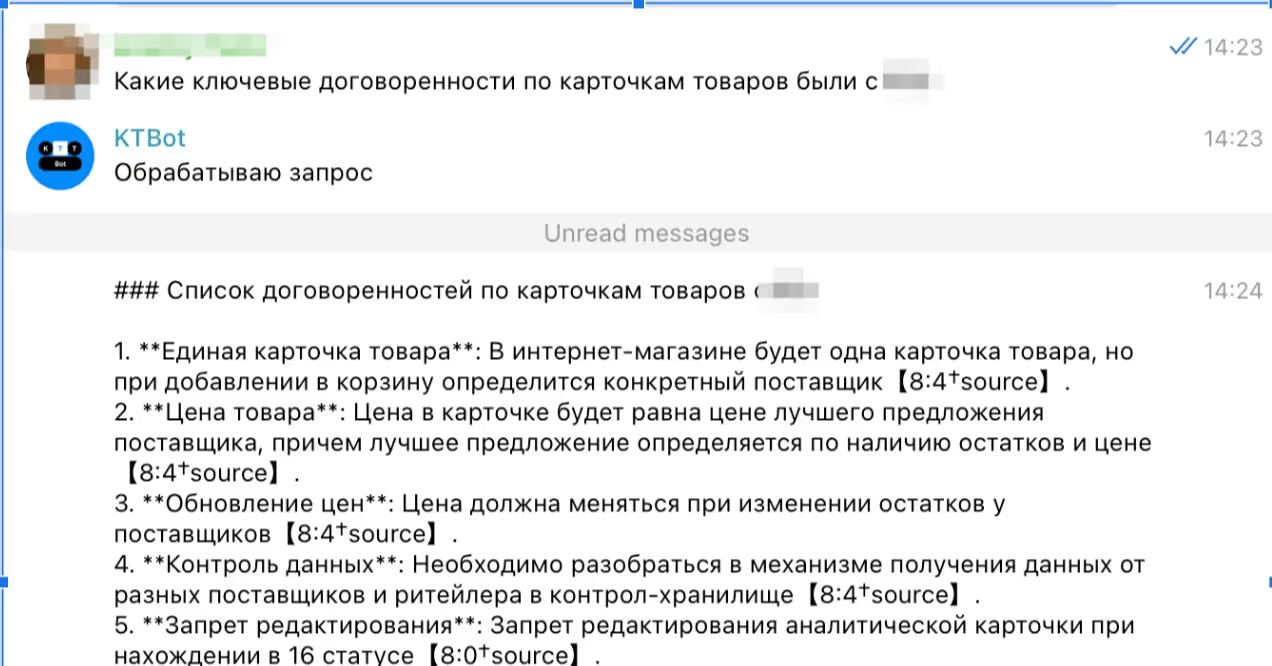
The AI secretary transcribes recordings using professional slang and terms, and can create full or short minutes of the meeting and send it to participants.
AI trains your employees and keeps a finger on the pulse of the department
Another example: a new employee joins the company and needs to study all regulations and comply with them. If a newcomer does not complete the training, his actions can lead to the loss of money and the company's reputation. For example, by forgetting to mention an important term of the deal, a sales manager runs the risk of losing a key customer.
Department heads usually train new employees themselves or get it for the key, most professional, and often the most expensive employees. They monitor compliance with regulations: they review meeting records, analyze and evaluate managers' behavior, give feedback, check advertising layouts, and so on. This takes a lot of time that could be devoted to novice adaptation or marginal sales tasks.
The AI Secretary will take on the typical and regulated part of this work. He will analyze the recording of the conversation between the new employee and the client, compare it with the regulations and give detailed feedback with recommendations.
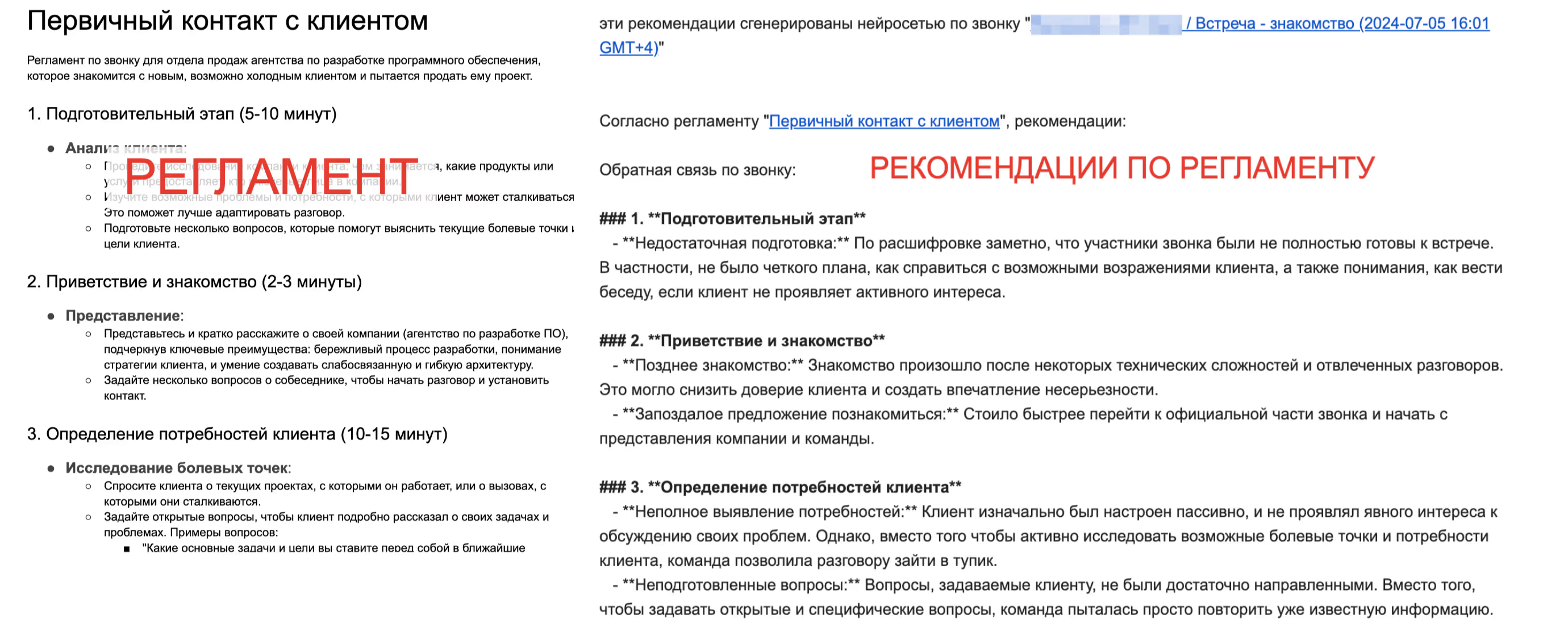
The AI Secretary can also create a report on any meeting metrics adopted by the department, such as employee friendliness, compliance with stages, and fixing agreements.
How the introduction of AI contributes to business growth
It saves time. AI takes on the task of processing all the information that the company has accumulated: it quickly analyzes data and provides brief summaries. This allows you to quickly recall important details in minutes and avoid the risk of looking unprepared. The choice here is not between a “manual” approach and AI, but between when the work is not done and when an assistant does it effectively.
It saves money. Out of eight working hours, an employee is really productive, only four in which you need to complete the maximum tasks. Transferring routine to AI assistants allows them to focus on what is important and work better: experts estimate an increase in efficiency from the introduction of AI at 20-25%.
AI integration is like switching from a manual transmission to an automatic transmission: there are drawbacks, but the savings on manual actions are enormous.








